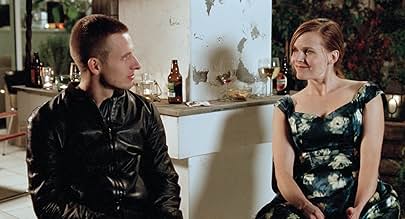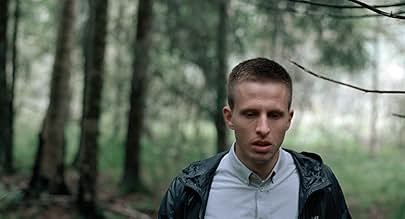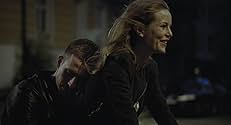AVALIAÇÃO DA IMDb
7,6/10
31 mil
SUA AVALIAÇÃO
Um dia na vida de Anders, um jovem toxicodependente em recuperação, que tira uma breve licença do seu centro de tratamento para fazer uma entrevista para um emprego e pôr a conversa em dia c... Ler tudoUm dia na vida de Anders, um jovem toxicodependente em recuperação, que tira uma breve licença do seu centro de tratamento para fazer uma entrevista para um emprego e pôr a conversa em dia com velhos amigos em Oslo.Um dia na vida de Anders, um jovem toxicodependente em recuperação, que tira uma breve licença do seu centro de tratamento para fazer uma entrevista para um emprego e pôr a conversa em dia com velhos amigos em Oslo.
- Direção
- Roteiristas
- Artistas
- Prêmios
- 19 vitórias e 21 indicações no total
Aksel Thanke
- Terapeut
- (as Aksel M. Thanke)
Tone Beate Mostraum
- Tove
- (as Tone B. Mostraum)
- Direção
- Roteiristas
- Elenco e equipe completos
- Produção, bilheteria e muito mais no IMDbPro
Avaliações em destaque
10maddo16
The most hard-hitting and resonant film I've seen in a long time, Oslo August 31st sets itself up with serene, fuzzy home footage and tales of blissful memories spent in the titular city of Oslo only to cut to the bleak life of Anders, a former heroin addict on his first day of life out of rehab. Searching for a meaning and a purpose in this new life he finds little in his friends' bourgeois city routines, which he neither desires nor feels he could achieve anyway, and their claims that "it'll all get better" fail to move a mind constantly probing and analysing the reality of his situation.
He soon undergoes an intense conversation in a park overlooking the city with his closest friend, wherein Anders pours out his thoughts of the time the two have spent apart, and the precision of their rapport matched with the lead's acting make the whole scene feel horribly real.
Anders wanders the often-empty city like a ghost, sitting in a café surrounded by the hollow dreams of others ("Plant a tree. Swim with dolphins. Write a great novel") and dwelling on the weight of his own existence. In two minds whether to leave the city, increasingly desperate and always beautifully shot, we follow him through the night until sunrise, when Anders appears to us in a sequence at his most unpredictable.
Undeniably disturbing, yet intimate and tender, this is a film that already feels close to my heart, one unafraid to bring up difficult questions and brilliantly able to provoke an idea of the absurdity of it all.
He soon undergoes an intense conversation in a park overlooking the city with his closest friend, wherein Anders pours out his thoughts of the time the two have spent apart, and the precision of their rapport matched with the lead's acting make the whole scene feel horribly real.
Anders wanders the often-empty city like a ghost, sitting in a café surrounded by the hollow dreams of others ("Plant a tree. Swim with dolphins. Write a great novel") and dwelling on the weight of his own existence. In two minds whether to leave the city, increasingly desperate and always beautifully shot, we follow him through the night until sunrise, when Anders appears to us in a sequence at his most unpredictable.
Undeniably disturbing, yet intimate and tender, this is a film that already feels close to my heart, one unafraid to bring up difficult questions and brilliantly able to provoke an idea of the absurdity of it all.
The journey from the other point. The conversations are fully enticing, pulls you in. The story starts as bright as day and slowly dwindles with the approach of night, and as it gets dark their is hope after all, of new day, new beginning. Beautifully handled the topic of drugs and addicts life after the program. How much we need the support of other people, family, friends and even strangers, if we really want to get out of the void created by drugs. Nice visuals and good acting.
Oslo, October 31st (2011)
A highly realistic, intimate view of a young man who has completed a drug abuse program and is trying to rejoin his life. It's a rough ride, sometimes boring, sometimes raw, but it's the real thing, and if you have an interest in this kind of common problem without watching a documentary, this is the movie.
Though set in Oslo, there is a universal quality to all of this. Yes, the leading man, Anders, has the usual problem getting jobs. But that's just the beginning. It's about friends who want to help and friends who expect him to help them be wild. It's about old girlfriends, new girlfriends, parties where you can't drink, family that wasn't adequate, and on and on.
And the temptation of real drugs, beyond drink.
It's odd to realize, but I think the bottom line is that most young people live in a culture that's on the edge, on purpose and for good reason. And there is a percentage of people who can't handle that, who need to go over the edge, and will always go over the edge. Some of those people understand it early and save themselves, others never can. And life is a series of crises.
This isn't a feel good movie about a man who succeeds (I'm not saying here if he succeeds or not—just that it's not some sunny happiness after a round with the devil). This is about what it might be like to be in the shoes of Anders, or anyone like him, and how almost impossible it is to rise up. And his friends and family are partly to blame, sad to admit.
The final few minutes of the film are poetic—elegiac might be a better word—and the opening to the film is similarly daring and edgy. It's odd and perhaps too bad the the middle—the bulk of it—is more prosaic. It's good, it's really good, but without the poetry we are sure to sink into empathy and sadness, watching what is surely so believable it is, somewhere, all too real.
A highly realistic, intimate view of a young man who has completed a drug abuse program and is trying to rejoin his life. It's a rough ride, sometimes boring, sometimes raw, but it's the real thing, and if you have an interest in this kind of common problem without watching a documentary, this is the movie.
Though set in Oslo, there is a universal quality to all of this. Yes, the leading man, Anders, has the usual problem getting jobs. But that's just the beginning. It's about friends who want to help and friends who expect him to help them be wild. It's about old girlfriends, new girlfriends, parties where you can't drink, family that wasn't adequate, and on and on.
And the temptation of real drugs, beyond drink.
It's odd to realize, but I think the bottom line is that most young people live in a culture that's on the edge, on purpose and for good reason. And there is a percentage of people who can't handle that, who need to go over the edge, and will always go over the edge. Some of those people understand it early and save themselves, others never can. And life is a series of crises.
This isn't a feel good movie about a man who succeeds (I'm not saying here if he succeeds or not—just that it's not some sunny happiness after a round with the devil). This is about what it might be like to be in the shoes of Anders, or anyone like him, and how almost impossible it is to rise up. And his friends and family are partly to blame, sad to admit.
The final few minutes of the film are poetic—elegiac might be a better word—and the opening to the film is similarly daring and edgy. It's odd and perhaps too bad the the middle—the bulk of it—is more prosaic. It's good, it's really good, but without the poetry we are sure to sink into empathy and sadness, watching what is surely so believable it is, somewhere, all too real.
The sober rationality of the young Norwegian intellectual classes provides a perfectly blank canvas on which to paint the conversely complex neuroses of the anti-hero, Anders. Anders is an intelligent and gifted opinionist and writer, but his addiction has left him riddled with insecurity. The film focuses on the most pivotal moment of this young man's life as he's tragically stuck between recovery and regression: that moment is both sprinkled with glimmers of hope and drenched in melancholia. Anders' contradiction is the eternal paradox of the addict, and perhaps Trier is presenting it as an allegory of the modern human condition. Anders Danielsen Lie gives an incredible performance as the enigmatic hero and the acting throughout is consistently authentic, convincing and engrossing. The soft-focus cinematography (Jakob Ihre) works well with a particularly engaging sound design which, along with very conscious direction, editing and general production design, makes for technically masterful cinema with an aesthetic that is both selectively minimal and enjoyably rich. Oslo is a tragedy. Its simple, melancholic tone and metropolitan landscapes make the film undeniably reminiscent of the French New Wave - think Hiroshima Mon Amour in present day Oslo. The film is minimal and stylized, presenting social realism in an artistic form without losing any of its dramatic potency to surrealism. Utterly convincing and captivating: an instant indie classic.
Triers second film in his Oslo trilogy depicts the complexities of how it is to return to a familiar place under different circumstances.
In Oslo, August 31st, we meet Anders (Anders Danielsen Lie), a former drug addict. Anders is on his day out from rehab in Oslo to attend a job interview. Before and after the interview, he takes the opportunity to meet up with friends, and problems left undone.
This is one of the best norwegian films out there, mainly because of how it depicts the urban city life in Oslo, and the challenges which follows a recovering drug addict. As a norwegian and a former Oslo citizen, this film hit me hard. With its social realistic style, this film makes you not just reflect upon the lives of drug addicts through the perspective of Anders, but also life in general through the conversation that Anders has with his friends.
Oslo, August 31st is a socratic masterpiece.
In Oslo, August 31st, we meet Anders (Anders Danielsen Lie), a former drug addict. Anders is on his day out from rehab in Oslo to attend a job interview. Before and after the interview, he takes the opportunity to meet up with friends, and problems left undone.
This is one of the best norwegian films out there, mainly because of how it depicts the urban city life in Oslo, and the challenges which follows a recovering drug addict. As a norwegian and a former Oslo citizen, this film hit me hard. With its social realistic style, this film makes you not just reflect upon the lives of drug addicts through the perspective of Anders, but also life in general through the conversation that Anders has with his friends.
Oslo, August 31st is a socratic masterpiece.
Você sabia?
- CuriosidadesRenate Reinsve's feature film debut. She had two lines. She would later reunite with director Joachim Trier, as the lead in A Pior Pessoa do Mundo (2021).
- Erros de gravaçãoAt the beginning of the film, when he dives into the lake holding a big stone, he is wearing a black jacket, when he emerges from the water he is wearing a white shirt.
- ConexõesFollowed by A Pior Pessoa do Mundo (2021)
- Trilhas sonorasPatch To Lucy
Written by E. Skodvin/O. Totland
Performed by Deaf Center
© 2005 Type Records
Principais escolhas
Faça login para avaliar e ver a lista de recomendações personalizadas
- How long is Oslo, August 31st?Fornecido pela Alexa
Detalhes
- Data de lançamento
- Países de origem
- Central de atendimento oficial
- Idiomas
- Também conhecido como
- Oslo, 31 de agosto
- Locações de filme
- Henrik Ibsens Gate 36, Oslo, Noruega(restaurant where Anders meets his sister's girlfriend)
- Empresas de produção
- Consulte mais créditos da empresa na IMDbPro
Bilheteria
- Faturamento bruto nos EUA e Canadá
- US$ 101.475
- Fim de semana de estreia nos EUA e Canadá
- US$ 9.564
- 27 de mai. de 2012
- Faturamento bruto mundial
- US$ 1.481.665
- Tempo de duração1 hora 35 minutos
- Cor
- Mixagem de som
- Proporção
- 1.85 : 1
Contribua para esta página
Sugerir uma alteração ou adicionar conteúdo ausente

























